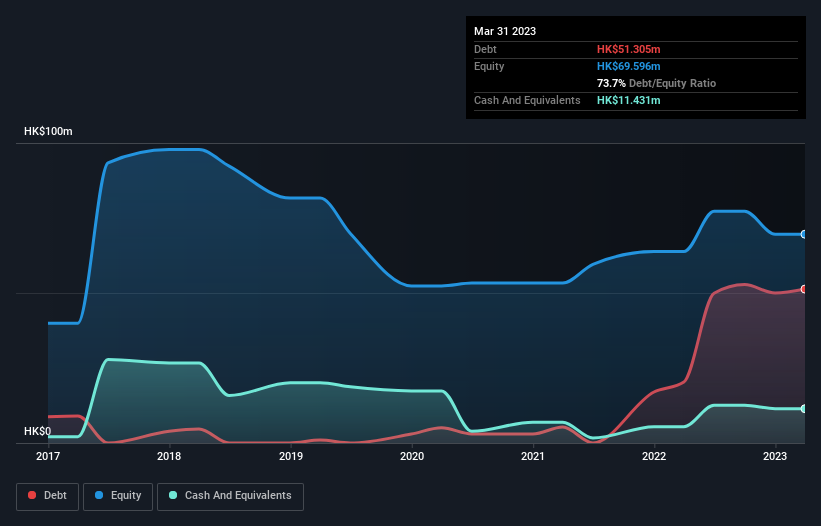
The external fund manager backed by Berkshire Hathaway's Charlie Munger, Li Lu, makes no bones about it when he says 'The biggest investment risk is not the volatility of prices, but whether you will suffer a permanent loss of capital.' So it might be obvious that you need to consider debt, when you think about how risky any given stock is, because too much debt can sink a company. Importantly, GME Group Holdings Limited (HKG:8188) does carry debt. But is this debt a concern to shareholders?
When Is Debt Dangerous?
Debt and other liabilities become risky for a business when it cannot easily fulfill those obligations, either with free cash flow or by raising capital at an attractive price. Part and parcel of capitalism is the process of 'creative destruction' where failed businesses are mercilessly liquidated by their bankers. While that is not too common, we often do see indebted companies permanently diluting shareholders because lenders force them to raise capital at a distressed price. Of course, debt can be an important tool in businesses, particularly capital heavy businesses. When we think about a company's use of debt, we first look at cash and debt together.
View our latest analysis for GME Group Holdings
What Is GME Group Holdings's Debt?
The image below, which you can click on for greater detail, shows that at December 2022 GME Group Holdings had debt of HK$51.3m, up from HK$20.3m in one year. On the flip side, it has HK$11.4m in cash leading to net debt of about HK$39.9m.

A Look At GME Group Holdings' Liabilities
Zooming in on the latest balance sheet data, we can see that GME Group Holdings had liabilities of HK$86.8m due within 12 months and liabilities of HK$526.0k due beyond that. Offsetting this, it had HK$11.4m in cash and HK$120.4m in receivables that were due within 12 months. So it can boast HK$44.4m more liquid assets than total liabilities.
This surplus liquidity suggests that GME Group Holdings' balance sheet could take a hit just as well as Homer Simpson's head can take a punch. On this view, lenders should feel as safe as the beloved of a black-belt karate master. When analysing debt levels, the balance sheet is the obvious place to start. But it is GME Group Holdings's earnings that will influence how the balance sheet holds up in the future. So when considering debt, it's definitely worth looking at the earnings trend. Click here for an interactive snapshot.
Over 12 months, GME Group Holdings made a loss at the EBIT level, and saw its revenue drop to HK$432m, which is a fall of 13%. That's not what we would hope to see.
Caveat Emptor
Not only did GME Group Holdings's revenue slip over the last twelve months, but it also produced negative earnings before interest and tax (EBIT). Its EBIT loss was a whopping HK$13m. Having said that, the balance sheet has plenty of liquid assets for now. That will give the company some time and space to grow and develop its business as need be. The company is risky because it will grow into the future to get to profitability and free cash flow. When analysing debt levels, the balance sheet is the obvious place to start. However, not all investment risk resides within the balance sheet - far from it. Be aware that GME Group Holdings is showing 5 warning signs in our investment analysis , and 3 of those are a bit unpleasant...
If, after all that, you're more interested in a fast growing company with a rock-solid balance sheet, then check out our list of net cash growth stocks without delay.
New: Manage All Your Stock Portfolios in One Place
We've created the ultimate portfolio companion for stock investors, and it's free.
• Connect an unlimited number of Portfolios and see your total in one currency
• Be alerted to new Warning Signs or Risks via email or mobile
• Track the Fair Value of your stocks
Have feedback on this article? Concerned about the content? Get in touch with us directly. Alternatively, email editorial-team (at) simplywallst.com.
This article by Simply Wall St is general in nature. We provide commentary based on historical data and analyst forecasts only using an unbiased methodology and our articles are not intended to be financial advice. It does not constitute a recommendation to buy or sell any stock, and does not take account of your objectives, or your financial situation. We aim to bring you long-term focused analysis driven by fundamental data. Note that our analysis may not factor in the latest price-sensitive company announcements or qualitative material. Simply Wall St has no position in any stocks mentioned.
About SEHK:8188
GME Group Holdings
An investment holding company, engages in civil engineering works in Hong Kong.
Excellent balance sheet, good value and pays a dividend.
Market Insights
Community Narratives



